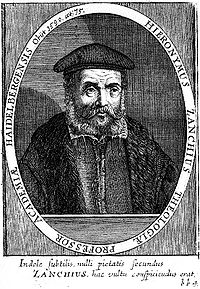- Girolamo Zanchi
-
Girolamo Zanchi (Latin "Hieronymus Zanchius," thus Anglicized to "Jerome Zanchi/Zanchius") (February 2, 1516 – November 19, 1590) was an Italian Protestant Reformation clergyman and educator.
He was born the son of a noble lawyer and historian, in Alzano Lombardo near Bergamo. His father died in the plague of 1528 and his mother died only three years later. At age 15 he entered the monastery of the Augustinian Order of Regular Canons, where he studied Aristotle, languages and divinity. After completing his studies, he went to Lucca, and there under the influence of Peter Martyr Vermigli he opted for a theological career, being especially impressed by Vermigli's lectures on Romans. In addition to works of the Fathers, he became aware of Martin Bucer and Philipp Melanchthon, also read Martin Luther's writings and the Swiss reformers. John Calvin, however, had the greatest influence on him.
Even after Vermigli’s forced flight in 1542, Zanchi remained as a teacher at the monastery school. In 1551, however, he also was forced into exile. After a brief stay in Geneva, he wanted to go to England, but was called to Strasbourg and worked there as a professor of the Old Testament at the college of St. Thomas. His style is legalistic, and he interpreted with meticulous accuracy. In his overall theological orientation, he tacked neither directly along a Lutheran or a Calvinist line, although he was reckoned a Calvinist. He was one of the most learned theologians of the second half of the 16th Century, if he is not considered to be an especially original thinker. He was regarded an excellent teacher.
The demand for Strasbourg faculty and pastors to commit themselves to the Augsburg Confession created difficulties for him. He had previously declined offers to move to Geneva and Lausanne because he was committed to Strasbourg. However, he could not remain after the controversy with the Lutheran superintendent Johann Marbach. Zanchi had described the differences in the doctrine of the Eucharist between the Lutheran and Reformed as being relatively minor and also taught a strict Calvinist doctrine of predestination. After receiving many consultations from theologians outside of Strasbourg, the disputing parties were able to reach an agreement in constructing a formula of unity (The Strasbourg Consensus) signed by all the city's preachers and professors.
When Calvin chided him for his equivocation, Zanchi went public with his views again causing the controversy to erupt anew. He consequently left from Strasbourg to become the pastor of the Italian Protestant congregation in the Graubünden in Chiavenna. In 1568 he received a call to the University of Heidelberg, where he took over the chair of Dogmatics formerly occupied by Zacharias Ursinus. Here he wrote important works which tend to bear either an apologetic or polemical character. His method of presentation is quite scholastic. After the Palatinate returned to Lutheranism during the reign of Elector Ludwig VI, Zanchi moved with many other Reformed professors to the Casmirianum, a Reformed academy in Neustadt in the dominions of Count Palatine Johann Casimir. He died during a return visit to Heidelberg and was buried in the University Church.
Zanchius was a voluminous writer whose works include, Confession of the Christian Religion and Observation on the Divine Attributes. He is perhaps best known for his book The Doctrine of Absolute Predestination, which is still in publication today.
The following is a translation of the inscription on the headstone of Zanchius' grave:
- 'Here Zanchius rests, whom love of truth constrained
- to quit his own and seek a foreign land.
- How good and great he was, how formed to shine,
- How fraught with science human and divine;
- Sufficient proof his numerous writings give,
- And those who heard him teach and saw him live.
- Earth still enjoys him, though his soul has fled:
- His name is deathless, though his dust is dead.'
Further reading
- Cuno (1898) (in German). "Zanchius, Hieronymus". In Allgemeine Deutsche Biographie (ADB). 44. Leipzig: Duncker & Humblot. pp. 679–683.
- Erich Wenneker (1998). Bautz, Traugott. ed (in German). Girolamo Zanchi. Biographisch-Bibliographisches Kirchenlexikon (BBKL). 14. Herzberg. ISBN 3-88309-073-5. http://www.bautz.de/bbkl/z/zanchi.shtml.
- Theologische Realenzyklopädie, volume 36, pp. 482-485
- Burchill, Christopher J. “Girolomo Zanchi: Portrait of a Reformed Theologian and his Work.” Sixteenth Century Journal 15 (1984): 185-205.
- Burnett, Amy Nelson. "Simon Sulzer and the Consequences of the 1563 Strasbourg Consensus in Switzerland," Archiv für Reformationsgeschichte, 88 (1992): 154-179
- Kittelson, James. “Marbach vs. Zanchi: the Resolution of Controversy in Later Reformation Strasbourg.” Sixteenth Century Journal 7 (1977): 31-44.
- Zanchius, Jerom. "The Doctrine of Absolute Predestination" translated by Augustus M. Toplady. Baker Book House, Grand Rapids, Michigan, USA, 1977. ISBN: 0-9010-9927-7.
External links
Categories:- 1516 births
- 1590 deaths
- People from Alzano Lombardo
- Italian theologians
- Italian Calvinists
- University of Heidelberg faculty
Wikimedia Foundation. 2010.

